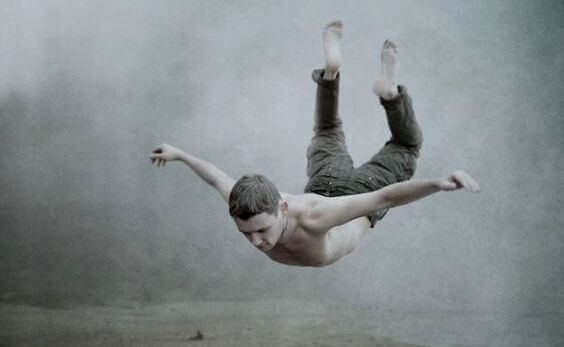Vertigo: A Form of Escape

Vertigo is a symptom presented by a growing number of people each day. It’s defined as feeling a loss of balance and/or the perception that everything is spinning around. According to a study published in the journal Mind and Brain (Mente y cerebro) (1), in up to a third of people, vertigo is not due to physical reasons, but rather psychological reasons. Meanwhile, a neuropsychological study by M. Dietrich (2) revealed that between 30-40% of cases of vertigo have mental origins.
People who suffer from non-physical vertigo define it in various ways. They say it involves an accumulation of sensations, including dizziness, fear, insecurity, numbness, lightheadedness, feelings of unreality, weakness, fatigue, increase in heart rate, needing to urinate, and feeling like they’re in a boat or walking on cotton.
“It’s more like a mental vertigo, the awareness of being on the edge of losing inner balance…; there was an impulse of suicide, a subtle and mysterious impulse which people give into often without realizing.”
-Yukio Mishima-
It’s not a constant feeling, but rather it comes in sudden attacks, usually isolated or emphasized by specific circumstances. Such circumstances may include a crowd of people, a shiny floor or one that has many geometric figures, a highway, an inclined space, and many more. Because crises of vertigo are unpredictable, the condition is highly incapacitating, and people end up hiding away in their houses and refusing to leave.
Psychogenic, or non-physical, vertigo
There seems to be an agreement between specialists that vertigo that does not come from an organic illness is produced by a state of anxiety. What they don’t agree on is how to interpret this anxiety, and therefore, the best way to treat it. In any case, even though there are no exact figures, it is known that vertigo tends to appear after a crisis of stress that comes from a loss, a separation, the illness of a loved one, or high pressure at work.

Sometimes vertigo occurs during panic attacks. Other times, it’s an independent symptom that can cause panic or become the source of new symptoms like frequent headaches or nausea. What they all have in common is the fact that diagnostic studies don’t reveal any ear or brain conditions that justify these sensations.
Vertigo attacks can be light or severe. They don’t seem to follow a determined pattern, which torments the people who experience them even more, because they never know when they’re going to happen. In general, they affect the lives of these people to different degrees, because there’s always the fear of fainting, losing control, or falling at any moment.
An interpretation of vertigo
While psychiatry and psychology associate vertigo exclusively with depression and stress, psychoanalysis considers it to be a symbolic representation of one’s mental state. Alfred Adler (3) studied it in detail and came to the conclusion that it expresses a hidden desire to avoid a situation. It’s a “roundabout detour,” which is why it feels like everything is “spinning around.”
Adler stated that it appears in response to an external demand that the person thinks is too much for them to handle. This demand could be occupational, familial, sexual, emotional, or of any other kind. The point is that the person is not aware of all of this, and so psychogenic vertigo develops.

In reality, the person is afraid of “falling,” or showing that they can’t respond to the external demand. This would diminish their reputation, which is why it’s perceived as falling. This results from an unconscious fear of inferiority.
Internally, the person feels like they’re incapable, but that’s not necessarily true. They might actually be very capable, but their doubts are stronger. The most complicated part is that they’re not aware of this insecurity, which is why it all manifests as vertigo.
In particular, people with psychogenic vertigo fear losing control when they’re in public, or even when they’re completely alone. They’re afraid of being in an extremely vulnerable situation. For Adler, the way out is to accept whatever it is they’re running away from, but it’s hard for them to do this by themselves. It is recommended to get professional help and/or participate in group laughter therapy.

(1) Tschan & J. Wiltink. “Vértigos.” Revista Mente y Cerebro, 55, 2012, Barcelona (76-79)
(2) Dieterich M, Eckhardt-Henn A. Neurological and somatoform vertigo syndromes. 2004; 75(3):281-302
(3) Alfred Adler. (2011). The Collected Clinical Works of Alfred Adler, Volume 1: The Neurotic Character. Alfred Adler Institute of Northwestern Washington.
This text is provided for informational purposes only and does not replace consultation with a professional. If in doubt, consult your specialist.








